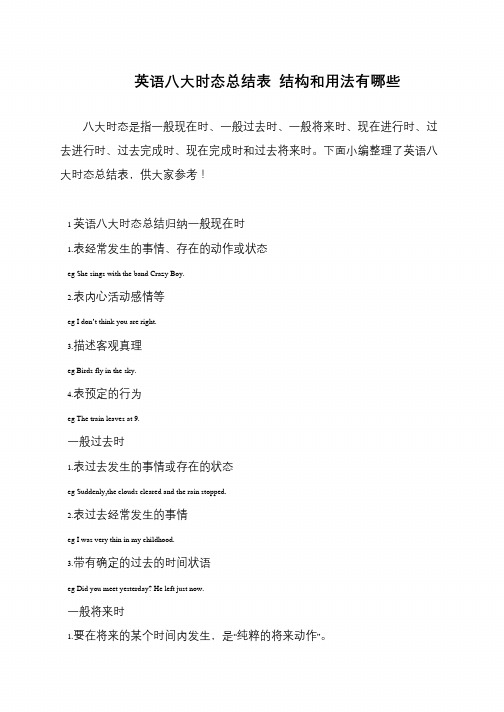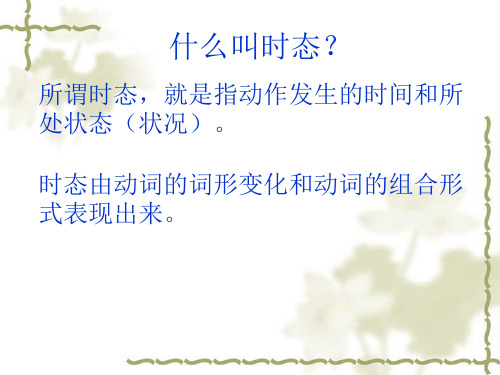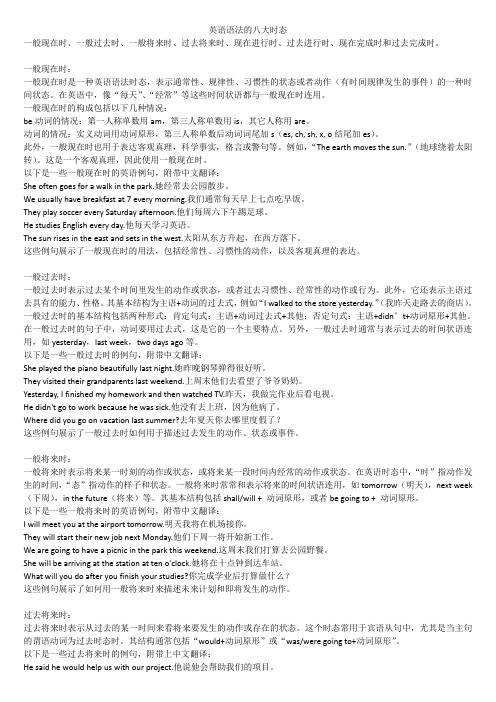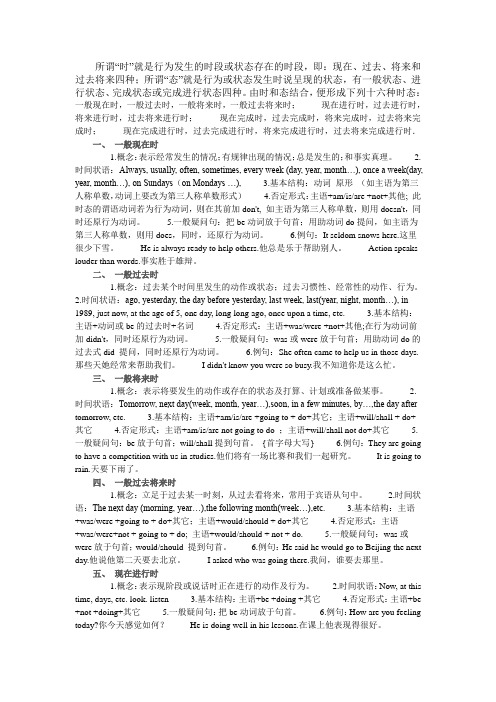现在进行时,过去进行时和过去将来时
英语八大时态是什么

英语八大时态是什么英语的八大时态包括:一般现在时、一般过去时、现在进行时、过去进行时、现在完成时、过去完成时、一般将来时、过去将来时。
一、一般现在时:概念:经常、反复发生的动作或行为及现在的某种状况。
时间状语:always,usually,often,sometimes,everyweek(day,year,month…),onceaweek,onSundays,etc.基本结构:①be动词;②行为动词否定形式:①am/is/are+not;②此时态的谓语动词若为行为动词,则在其前加don't,如主语为第三人称单数,则用doesn't,同时还原行为动词。
一般疑问句:①把be动词放于句首;②用助动词do提问,如主语为第三人称单数,则用does,同时,还原行为动词。
二、一般过去时:概念:过去某个时间里发生的动作或状态;过去习惯性、经常性的动作、行为。
时间状语:ago,yesterday,thedaybeforeyesterday,lastweek(year,night,month…),in1989,justnow,attheageof5,oneday,longlongago,onceuponatime,etc.基本结构:①be动词;②行为动词否定形式:①was/were+not;②在行为动词前加didn't,同时还原行为动词。
一般疑问句:①was或were放于句首;②用助动词do的过去式did提问,同时还原行为动词。
三、现在进行时:概念:表示现阶段或说话时正在进行的动作及行为。
时间状语:now,atthistime,thesedays,etc.基本结构:am/is/are+doing否定形式:am/is/are+not+doing.一般疑问句:把be动词放于句首。
四、过去进行时:概念:表示过去某段时间或某一时刻正在发生或进行的行为或动作。
时间状语:atthistimeyesterday,atthattime或以when引导的谓语动词是一般过去时的时间状语等。
英语八大时态总结表 结构和用法有哪些

英语八大时态总结表结构和用法有哪些
八大时态是指一般现在时、一般过去时、一般将来时、现在进行时、过去进行时、过去完成时、现在完成时和过去将来时。
下面小编整理了英语八大时态总结表,供大家参考!
1 英语八大时态总结归纳一般现在时
1.表经常发生的事情、存在的动作或状态
eg She sings with the band Crazy Boy.
2.表内心活动感情等
eg I don’t think you are right.
3.描述客观真理
eg Birds fly in the sky.
4.表预定的行为
eg The train leaves at 9.
一般过去时
1.表过去发生的事情或存在的状态
eg Suddenly,the clouds cleared and the rain stopped.
2.表过去经常发生的事情
eg I was very thin in my childhood.
3.带有确定的过去的时间状语
eg Did you meet yesterday? He left just now.
一般将来时
1.要在将来的某个时间内发生,是“纯粹的将来动作”。
一般现在时和现在进行时和过去进行和一般将来时和过去将来时

所谓时态,就是指动作发生的时间和所 处状态(状况)。
时态由动词的词形变化和动词的组合形 式表现出来。
那么时间有几种呢?
1.现在:眼下这一时刻,或一段时 间。这一时间伸缩性较大,可长可 短。英语用动词原形或现在式表现 在。 2.过去:指现在这时刻以前的某一 时刻、某一 段时间或者所有过去时 间。用动词的过去式表示过去。
现在
时态表示的4种时间
过去---指现在这时刻以前的某一时刻、某一
段时间或者所有过去时间。用动词的过去 式表示过去。 worked
过去某一时刻 现在
spoke
过去一段时间
时态表示的4种时间
将来 ---指现在以后的任何时刻、时段或全部时间。
用will或shall表示将来。
未来 某一时刻 现在
will work will speak
I am going to play computer games this afternoon.
We are going to sing this song together.
过去进行时
概念:表示过去某时 正在进行的状态或动 作。
现在,将过去进行时与现在进行时进行比较, 两者有何不同? He was dancing Nobody in the classroom yesterday.
7.The oldest kind of computer _____ the abacus. A. is B. was C. has been D. have been 8. I’ll tell him all about it as soon as he ____.
A. come back B. comes back C. will come back D. is going come back
八大时态时间轴

一.八大时态的基本用法
1.一般现在时和一般过去时
时间点:现在(一般现在时)
过去(一般过去时)
表达含义:现在经常发生或者反复发生的动作(一般现在时)
过去经常发生或者反复发生的动作(一般过去时)
构成:动词原形(第三人称动词后加-s/-es)
时间轴表示:
2.现在进行时和过去进行时
时间点:此刻(现在进行时)
过去某时刻正在进行(过去进行时)
表达含义:此刻说话时正在进行的动作(现在进行时)
过去某一时刻正在进行的动作(过去进行时)
构成:be(am/is/are/were/was+现在分词)
时间轴表示:
3.一般将来时和过去将来时
时间点:从现在看将来某一个刻(一般将来时)
从过去看将来某一刻(过去将来时)
表达含义:将来某一个时间点将要发生的动作(一般将来时)
从过去看将来某一个时间点将要发生的动作(过去将来时)
构成:will/would+动词原形
时间轴表示:
4.现在完成时和过去完成时
时间点:时间截止到目前为止动作已经完成(现在完成时)
时间截止到过去某一刻动作已经完成(过去完成时)
表达含义:强调不久前发生的动作对现在产生的影响(现在完成时)
表示一个动作在过去某一个时间或动作之前已经完成(过去完成时)
构成:have/has/had+动词过去分词
时间轴表示:。
英语语法的八大时态

英语语法的八大时态一般现在时、一般过去时、一般将来时、过去将来时、现在进行时、过去进行时、现在完成时和过去完成时。
一般现在时:一般现在时是一种英语语法时态,表示通常性、规律性、习惯性的状态或者动作(有时间规律发生的事件)的一种时间状态。
在英语中,像“每天”、“经常”等这些时间状语都与一般现在时连用。
一般现在时的构成包括以下几种情况:be动词的情况:第一人称单数用am,第三人称单数用is,其它人称用are。
动词的情况:实义动词用动词原形,第三人称单数后动词词尾加s(es, ch, sh, x, o结尾加es)。
此外,一般现在时也用于表达客观真理,科学事实,格言或警句等。
例如,“The earth moves the sun.”(地球绕着太阳转)。
这是一个客观真理,因此使用一般现在时。
以下是一些一般现在时的英语例句,附带中文翻译:She often goes for a walk in the park.她经常去公园散步。
We usually have breakfast at 7 every morning.我们通常每天早上七点吃早饭。
They play soccer every Saturday afternoon.他们每周六下午踢足球。
He studies English every day.他每天学习英语。
The sun rises in the east and sets in the west.太阳从东方升起,在西方落下。
这些例句展示了一般现在时的用法,包括经常性、习惯性的动作,以及客观真理的表达。
一般过去时:一般过去时表示过去某个时间里发生的动作或状态,或者过去习惯性、经常性的动作或行为。
此外,它还表示主语过去具有的能力、性格。
其基本结构为主语+动词的过去式,例如“I walked to the store yesterday.”(我昨天走路去的商店)。
一般过去时的基本结构包括两种形式:肯定句式:主语+动词过去式+其他;否定句式:主语+didn’t+动词原形+其他。
英语16大语态

所谓“时”就是行为发生的时段或状态存在的时段,即:现在、过去、将来和过去将来四种;所谓“态”就是行为或状态发生时说呈现的状态,有一般状态、进行状态、完成状态或完成进行状态四种。
由时和态结合,便形成下列十六种时态:一般现在时,一般过去时,一般将来时,一般过去将来时;现在进行时,过去进行时,将来进行时,过去将来进行时;现在完成时,过去完成时,将来完成时,过去将来完成时;现在完成进行时,过去完成进行时,将来完成进行时,过去将来完成进行时.一、一般现在时1.概念:表示经常发生的情况;有规律出现的情况;总是发生的;和事实真理。
2.时间状语:Always, usually, often, sometimes, every week (day, year, month…), once a week(day, year, month…), on Sundays(on Mondays …),3.基本结构:动词原形(如主语为第三人称单数,动词上要改为第三人称单数形式)4.否定形式:主语+am/is/are +not+其他; 此时态的谓语动词若为行为动词,则在其前加don't, 如主语为第三人称单数,则用doesn't,同时还原行为动词。
5.一般疑问句:把be动词放于句首;用助动词do提问,如主语为第三人称单数,则用does,同时,还原行为动词。
6.例句:It seldom snows here.这里很少下雪。
He is always ready to help others.他总是乐于帮助别人。
Action speaks louder than words.事实胜于雄辩。
二、一般过去时1.概念:过去某个时间里发生的动作或状态;过去习惯性、经常性的动作、行为。
2.时间状语:ago, yesterday, the day before yesterday, last week, last(year, night, month…), in 1989, just now, at the age of 5, one day, long long ago, once upon a time, etc.3.基本结构:主语+动词或be的过去时+名词4.否定形式:主语+was/were +not+其他;在行为动词前加didn't,同时还原行为动词。
英语中的八大时态

英语中的八大时态英语时态8种基本时态有:一般现在时、一般现过去时、现在进行时、过去进行时、现在完成时、过去完成时、—般将来时、过去将来时。
一般现在时:一般现在时,是一种英语语法形式。
表示通常性、规律性、习惯性、真理性(即事实)的动作或状态,或者动作有时间规律发生的事件的一种时间状态。
在英语语法中,“时“指动作发生的时间,”态“指动作的样子和状态。
一般现过去时:一般过去将来时表示从过去的某一时间来看将来要发生的动作或呈现的状态。
在英语时态中,“时“指动作发生的时间,”态“指动作的样子和状态。
一般过去将来时的出发点是过去,即从过去某一时刻看以后要发生的动作或状态。
现在进行时:现在进行时,专业术语,是英语的一种时态,表示现在进行的动作或存在的状态。
在英语时态中,“时“指动作发生的时间,”态“指动作的样子和状态。
现在进行时表示动作发生的时间是“现在”,动作目前的状态是“正在进行中”。
过去进行时:过去进行时,表示过去在某一时间段或某一段时间内正在发生或进行的动作或状态。
在英语时态中,“时“指动作发生的时间,”态“指动作的样子和状态。
现在完成时:由“have/has+过去分词”构成,主要有两个含义:表示动作发生在过去,但与现在的情况有联系,有时无时间状语,有时和一些表示不确定的过去时间状语连用,如:many times,just,yet,ever,never,already,before,so far,by now等连用。
过去完成时:过去完成时:表示过去某一时间或动作以前已经发生或完成了的动作,对过去的某一点造成的某种影响或是结果,用来指在另一个过去行动之前就已经完成了的事件。
在英语时态中,“时“指动作发生的时间,”态“指动作的样子和状态。
它表示动作发生的时间是“过去的过去”,侧重事情的结果。
—般将来时:一般将来时表示将来某一时段的动作或状态,或将来某一段时间内经常的动作或状态。
在英语时态中,“时“指动作发生的时间,”态“指动作的样子和状态。
过去将来时,现在进行时,过去进行时

外教一对一过去将来时,现在进行时,过去进行时过去将来时一、构成:1) 肯定形式:S+助动词 should/would/was/were going to+动词原形+O.2) 否定形式:S+助动词should/would not/was/were not going to+动词原形+O.3) 疑问形式:助动词Should/Would +S.+动词原形+O./ Was/Were + S. +going to+动原+O.二、用法:1) 表示从过去某一段时间看将来发生的动作或存在的状态。
常用在宾语从句中,由“would+动原”构成。
如:He said he would buy some fruits for his sister.He asked when the meeting would end.2) 表示曾经打算或准备要做的动作,用was/were going to +动原。
如:I thought it was going to rain soon.They were going to start a new job when I saw them then3) 瞬间动词go, come, leave, arrive, start等,其过去进行时表示过去按计划即将发生的动作。
现在进行时一、构成:1) 肯定形式:S +be+动词的现在分词v.ing.2) 否定形式:S + be not动词现在分词 v.ing.3) 疑问形式:Be +S+动词现在分词 v.ing.二、用法:1)表示此时此刻正在进行的动作。
如:-What are you doing?外教一对一-I am reading English.2) 表示现阶段正在进行的动作或持续的状态。
如;They are studying hard this term.3) go, leave, arrive, start等动词用现在进行时表示将来。
常用于人,有“意图、打算、安排”含义,如:I am leaving Beijing this Sunday.Are you staying here till next week?4)当时间状语为now, these days等时或当句子中含有look, listen, can you see, can’t you see之类的暗示词,要使用现在进行时5)但要注意下列这些动词一般不用于现在进行时态的句子中。
- 1、下载文档前请自行甄别文档内容的完整性,平台不提供额外的编辑、内容补充、找答案等附加服务。
- 2、"仅部分预览"的文档,不可在线预览部分如存在完整性等问题,可反馈申请退款(可完整预览的文档不适用该条件!)。
- 3、如文档侵犯您的权益,请联系客服反馈,我们会尽快为您处理(人工客服工作时间:9:00-18:30)。
一、现在进行时(一)结构由Be(am/is/are)+动词—ing 构成。
(二)用法1、表示说话时刻正在进行的动作及行为,或者包括说话时刻在内的一段时间正在进行的动作。
常用时间状语及标志词:now( at the moment ) , listen , look , this week , this evening , these days 等。
Listen , Someone is playing the piano in the next room .2、表示一种渐进的过程。
My younger brother is becoming more and more interested in English .3、与always , all the time , forever 等连用,表示说话人某种强烈的情感,如:赞许、批评;喜欢、厌恶等。
例如:He is always thinking of others , not of himself . (表示赞许)他总是为他人着想,而不为自己。
She is often doing well at school. (表示满意)她在学校学习挺不错的。
Are you feeling better today? (表示亲切)你今天觉得好一些吗?One of my roommates is constantly leaving things abou(t. 表示不满)我的一个室友老是乱扔东西。
Some sellers are ofte n knocking at our door and promoti ng their products to us(.表示不喜欢)有些推销员老是敲我家的门,向我们推销他们的产品。
4、表示移位的动词,如go,come,leave,start,arrive等,其现在进行时可表将来。
She is leaving for Beijing next weak .My friend is coming for dinner .(三)句型1、肯定句:主语+ be(am/is/are)+动词—ing +其他。
I am studying now .2、否定句:主语+ be +not+动词一ing +其他。
I am not studying now .3、一般疑冋句:Be+主语+动词一ing +其他?Is she studying now ? Yes ,she is ./No,she isn't.4、特殊疑问句:特殊疑问词+ Be+主语+动词一ing +其他?What are you doing now ?(四)动词的现在分词形式构成的几种方法:1、一般在动词原形结尾直接加-ing 。
read-reading ,go-going ,visit-visiting2 、以不发音字母e结尾的动词,去e再加-ing。
live-living, write-writing ,make-making,take-taking3、以重读闭音节结尾且末尾只有一个辅音字母的词,双写这个字母再加-ing 。
sit-sitting,begin-beginning,get-getting,run-running,put-putting4 、少数几个以ie结尾的动词,变ie为y再加-ing 。
die-dy in g, lie-ly ing, tie-tyi ngh )clothes? Yes ,she is现在进行时态练习题一、写出下列动词的现在分词形式:二、根据句意,用所给动词的适当形式填空:1. Listen, Mr. Wu __________________ on the phone (talk).2. I __________________ soccer now. I ' m walking (nptay)3. ---Is your father at home?---Yes, he is .He ____________________ a TV show. (watch)4. They _________________ to go to the shop now. (want)5. --- ___________ you __________ for your friends? (wait)---No, I ' m not.6. Steve is very busy. He ___________ a letter (write)7. Don' t speak! My father _________________ (sleep).8. It ' s twelve o ' clock. The students ________ (have) lunch.9. Don' t go out! It ___________ outside. (rain)10. ---Why are you sta nding here , Dave ?---I_____________________ for Scott. (wait)11. The boys _____________ (help) their mother in the kitche n now.12. The sky is blue and the sun ___________ (shi ne).13. What ______ t hose people ________ (do) now? They ____________ (look)at the pictures.14. Look, Sam ____________ (dig) in the garde n.15. Are you ____________ (th ink) about your En glish less on?16. The childre n ____________ (liste n) to the music.17. _______ he __________ (run) on the playground?18. _______ Jim and Pat ____________ (read) right now?19. What are they doing? They _____________ (swim) in the sea?20. What are you doing? I ______________ (play) the pia no.三、按要求改写句子。
1. The children are making a model.( 否定句)2. Tim is eating an apple.( 一般疑问句)3. Are you doing your homework now?( 作肯定和否定回答)4. They are studying at home. (at school)(改为选择疑问句)_____ they _________ at home ______ at school?5. Miss Wang is sitting in a sofa.( 对划线部分提问)6. They are worki ng in a factory these days.7. She is learning the piano this year.( 用learning the violin 改为选择疑问句)8. Helen ' father is cleaning his car.(对划线部分提问)9. I am reading English in the garden.( 对划线部分提问)10. Tom and Bob are listening to the radio.( 对划线部分提问)11. I am wanting to buy a hot dog for my lunch.( 改错)二、过去进行时(一)结构由was/were+动词-ing构成。
(二)用法表示过去某一时刻或某一段时间正在进行或发生的动作。
动作发生的特指时间常用一个短语或时间状语从句来表明,如如: at this time yesterday,at 7:00 yesterday ,last night ,from seven to nine ,at that time以when或while引导的时间状语从句等。
My family were watch ing TV at this time yesterday .注意:(1)以when引导的时间状语从句中,从句动作,主句用过去进行时,表示一个动作发生时,另一个动作正在进行。
Whe n he called me , I was hav ing dinn er .(2)以while引导的时间状语从句中,从句与主句的动作在过去某一时刻同时进行,while 常译为“当……的时候,同时”。
Tom was doing his homework while hie sister was watchi ng TV .过去进行时练习题一、用所给动词的适当形式填空1.1 _____________ (play) computer games at ten last ni ght.2. Jim ' s family_ ____________ (have) supper when I came in.3. It ________ (rain) hard at this time yesterday.4. What ___ ou _________ (do) while I _________ (make) a model pla ne.5. He ___ u st _________ (leave) whe n the teleph one rang.6. We 一—(have) a P.E class at four yesterday.7. They _____________ (read) at eight yesterday evening.8.1 ______________ (do) my homework at that time whe n you called me.9. ____ ou ________ sweep) the floor while your mother _________ ok)?10. We _____________________(not talk) with each other yesterday morni ng.11. What ___ ou ______ do) at eight last night?12. I ___________________ (work) from six to eight every evening two years ago.13. She _________________ (walk) home whe n she ____ ee) her old frie nd.14. I ____________________ (read) a no vel whe n I _____ ave) a sudde n idea.15. Coli n ________ lay) football with them at seve n yesterday eve ning.16. ___ hey _________ (help) you with your En glish from 8 to 10 last night?17. We __________ (liste n) to the music while they ________________ (dan ce).18. My son _______________ (brush) his teeth whe n I ______ all) him.二、按要求改写下列句子1. It was raining hard when we left the cinema.( 否定句)2. We were watching TV this time yesterday.( 一般疑问句)3. Were you talki ng on the pho ne whe n the doorbell rang?( 作肯定回答和否定回答)4. She was reading at nine o 'lock last night.( 用watching TV 改为选择疑问句)5. They were worki ng in a factory those days.( 对戈U线部分提问)6. They were hav ing a volleyball match this time last week.( 对戈U线部分提问)7. The policeme n were running after a thief at 8 last ni ght.( 对戈U线部分提问)8. The teacher was talk ing with a naughty boy whe n the teleph one rang.( 对戈U线部分提问)三、选择题1」______ cooked a meal whe n you _____ m e.a. cooked, were ringingb. was cook in g, ra ngc. was cook ing, were ringingd. cooked, ra ng2. He said he ____ to draw a pla ne on the blackboard at that time.a. triesb. triedc. was tryi ngd. will try3. While she _____ TV, she ______ a sound outside the room.a. was watchi ng, was heari ngb. watched, was heari ngc. watched, heardd. was watchi ng, heard4. They ____ a football game from 7 to 9 last ni ght.a. did, read, was see ingb. did, read, sawa. were watchi ngb. watchc. watchedd. are watch ing5. What book __ you _______ w he n I ____ y ou at four yesterday after noon?a. did, read, was see ingb. did, read, sawc. were, reading, sawd. were, reading, was seeing6.It was Friday evening. Mr and Mrs. Green _____ ready to fly to England.a. are gettingb. getc. were gettingd. got7.Lei Feng ____ always ___ of others when he _____ in the army.a. is, thinking, wasb. was, thinking, isc. did, think, isd. was, thinking, was8. __________ A girl ___________________________ my pen fall off the table when she me.a. saw, passedb. was seeing, passedc. was seeing, passed. was seeing, was passing9. _______ We _____________________________________ for tom at ten last Sunday. He often kept us _ .a. were waiting, waitingb. were waiting, waitc. waited, waitingd. waited, wait10. ______ He his father on the farm the whole afternoon last Saturday.a. helpsb. would helpc. was helpingd. is helping11. __________________ W hile mother ______ some washing, I a kite for Kate.a. did, madeb. was doing, madec. was doing, was makingd. did, was making12. _______ " _______________________ you angry then?" "they too much noise."a. are, were makingb. were, were makingc. are, maded. were, made13. ______ He __________________________ some cooking at that time, so mea. did, heardb. did, didn't hearc. was doing, heardd. was doing, didn't hear14. ________________________ This time yesterday jack his bike. He TVa. repaired, didn't watchb. was repairing, watchedc. repaired, watchedd. was repairing, wasn't watching15. __________________________________ His parents wanted to know how he on with his new classmates.a. was gettingb. getsc. is gettingd. will get三、过去将来时表示过去的某时以后将要发生的动作。
